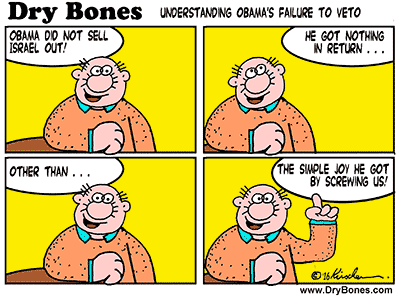Dov Lipman, who served as a member of Israel's 19th Knesset, writes about Obama’s revisionist ‘Promised Land’ -- a scathing review of the errors and outright misleading claims in Obama's new book.
I have no problem with criticism of Israel. We can debate the issues in intellectually honest discussions, and in the end, we may have to agree to disagree about Israel’s policies. But no one should accept a book that is filled with historical inaccuracies that invariably lead innocent and unknowing readers to reach false conclusions. Such a devastating book has real-life ramifications and consequences.
It is terribly disappointing. I surely would have expected truth, accuracy and fairness from Barack Obama, America’s 44th president. But the falsehoods and inaccuracies in this memoir only feed the theory that Obama was, in fact, anti-Israel. Now, through A Promised Land, he seeks to convince others to join him. [emphasis added]
I know that that there are those who would argue that in some ways America has become a safe refuge for the Jewish people, but if you’ve gone through the Holocaust, then that does not offer the same sense of confidence and security as the idea that the Jewish people can take care of themselves no matter what happens. That makes it a fundamentally just idea.
America's strong bonds with Israel are well known. This bond is unbreakable. It is based upon cultural and historical ties, and the recognition that the aspiration for a Jewish homeland is rooted in a tragic history that cannot be denied. [emphasis added]
You mentioned Rashid Khalidi, who is a professor at Columbia. I do know him because he talked at the University of Chicago and he is Palestinian, and I do know him and I have had conversations with him.
He is not one of my advisers, he is not one of my foreign policy people, his kids went to the lab school where my kids go as well.
He is a respected scholar although he vehemently disagrees a lot of Israel policy."

|
| Obama, with his wife and Khalidi |
A special tribute came from Khalidi's friend and frequent dinner companion, the young state Sen. Barack Obama. Speaking to the crowd, Obama reminisced about meals prepared by Khalidi's wife, Mona, and conversations that had challenged his thinking.Obama could have answered honestly that Khalidi was a friend with whom he had little contact after his move to New York and that Khalidi was an Arab friend just as he had Jewish friends.
His many talks with the Khalidis, Obama said, had been "consistent reminders to me of my own blind spots and my own biases. . . . It's for that reason that I'm hoping that, for many years to come, we continue that conversation -- a conversation that is necessary not just around Mona and Rashid's dinner table," but around "this entire world."
...And yet the warm embrace Obama gave to Khalidi, and words like those at the professor's going-away party, have left some Palestinian American leaders believing that Obama is more receptive to their viewpoint than he is willing to say.
Their belief is not drawn from Obama's speeches or campaign literature, but from comments that some say Obama made in private and from his association with the Palestinian American community in his hometown of Chicago, including his presence at events where anger at Israeli and U.S. Middle East policy was freely expressed. [emphasis added]
For a true friend, Obama also chose peculiar associates. He was quite friendly with Rashid Khalidi, a former director of the official press agency for the Palestine Liberation Organization (and now a professor at Columbia). Khalidi, who has called Israel an "apartheid" state and who defends the right of Palestinians to use violence against Israel, founded a group called the Arab American Action Network. When Obama served as a director of the Woods Fund in 2001 and 2002, the foundation donated $75,000 to the AAAN, for projects like an "oral history" project on the "Nakbah," which translates as "catastrophe," and is the name Palestinians use for the birth of Israel. Khalidi held a fundraiser for Obama when the latter ran for Congress in 2000 [emphasis added]We should note in passing who else Obama worked with at the Woods Fund. Aaron Klein wrote in February 2008: Obama Worked With Terrorist
Obama served on the Wood's Fund board alongside William C. Ayers, a member of the Weathermen terrorist group which sought to overthrow of [sic] the U.S. government and took responsibility for bombing the U.S. Capitol in 1971.Speaking of associating with terrorists, note that Mona Charen refers to Khalidi as "a former director of the official press agency for the Palestine Liberation Organization."
Ayers, who still serves on the Woods Fund board, contributed $200 to Obama's senatorial campaign fund and has served on panels with Obama at numerous public speaking engagements. Ayers admitted to involvement in the bombings of U.S. governmental buildings in the 1970s. He is a professor at the University of Illinois at Chicago. [emphasis added]
“If the Israelis had any brains they could neutralize Palestinian irredentism just by giving back the West Bank,” asserted Rashid Khalidy, an American-educated Palestinian who teaches political science at the American University of Beirut and also works for the P.L.O. “It would split us.”
The Post's defense of Rashid Khalidi ["An 'Idiot Wind,' " editorial, Oct. 31] was generally commendable, but in fairness to Sen. John McCain, it should be noted that Mr. Khalidi was indeed "a PLO spokesman."
In the early years of the Lebanese civil war, Mr. Khalidi was the Beirut-based spokesman for the Palestine Liberation Organization, and his office was a stop on the daily rounds of journalists covering that conflict. As we used to say in the pre-electronic newspaper business: Check the clips.
THOMAS W. LIPPMAN
The Middle East Institute
Washington
"They [Jewish supporters] attributed these whisper campaigns not to any particular position I’d taken (my backing of a two-state solution and opposition to Israeli settlements were identical to the positions of the other candidates) but rather to my expressions of concern for ordinary Palestinians; my friendships with certain critics of Israeli policy, including an activist and Middle East scholar named Rashid Khalidi; and the fact that, as Ben [Rhodes] bluntly put it, 'You’re a Black man with a Muslim name who lived in the same neighborhood as Louis Farrakhan and went to Jeremiah Wright's church.'”

 Elder of Ziyon
Elder of Ziyon






 Bat-Yam, November 26 - Sources close to the father of a local family reported today that he has yet to receive an explanation from the social media giant Twitter as to its failure to date to indicate his wife's mother's post last week asserting that her baked chocolate snack food has proved superior to all others, even as the company rushes to append such disclaimers to other, less manifestly-false tweets, notably those surrounding the recent US presidential election results.
Bat-Yam, November 26 - Sources close to the father of a local family reported today that he has yet to receive an explanation from the social media giant Twitter as to its failure to date to indicate his wife's mother's post last week asserting that her baked chocolate snack food has proved superior to all others, even as the company rushes to append such disclaimers to other, less manifestly-false tweets, notably those surrounding the recent US presidential election results.


































